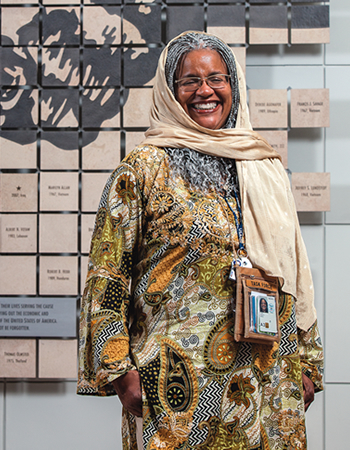The translator
Leslie Flagg '91 works in emerging markets to close the information gap between sectors

By Lena Singer | Photo by Kevin Manning
Leslie Flagg '91 last saw a fellow Kellogg alumnus in Helmand Province, the opium-rich region of southern Afghanistan that was the site of more casualties than almost any other in the recent war. Among the things the graduates did not have in common, she says, was that "he was a lieutenant colonel in the U.S. Marines, and I was a civilian."
Flagg, now based in Washington D.C., was in Helmand Province as a private enterprise officer for the U.S. Agency for International Development (USAID), which provides educational, health, governance, humanitarian and economic assistance to developing and war-torn countries.
One of her projects was to help Helmand's Afghan National Police (ANP) officers receive their salaries on time and in full. Prior to the assignment, Helmand's police officers were paid in cash. "You can imagine what happens when you're in a cash system," Flagg says.
Flagg and her colleagues expanded the ANP's national pilot program to Helmand. Called M-Paisa, the mobile money transfer system is a secure and reliable alternative to cash payments. Using this system, officers were paid via mobile phones, each equipped with an officer's unique identification number and data card. Part of the military's effort to build Afghan security, the project required the support of the Afghan government and a private sector telecommunications partner, Roshan, to provide the phones and related technology.
As a USAID officer, Flagg was a liaison between the groups.
"I'm like a translator," she says. "There is information on all sides that can't be shared with the others, and I help the sectors understand each other's actions."
Flagg returned to the United States in September 2012 and continues to work for USAID in Washington. For her next assignment, she hopes to be stationed in Pakistan or another country in the Next Eleven — 11 developing nations that economists believe could become the world's largest economies by the end of this century.
Prior to her assignment in Afghanistan, Flagg was a USAID private enterprise officer in Nigeria — another N-11 country — where she worked on a team that organized thousands of small-scale rice farmers in a large-scale production, processing and marketing partnership with the private sector.
In countries like Afghanistan, Nigeria and Pakistan, she explains, "It's not just the resources [the development community] bring into the government, it's the capacity to build and connect to other parts of the world. The whole agenda is to work yourself out of a job."


